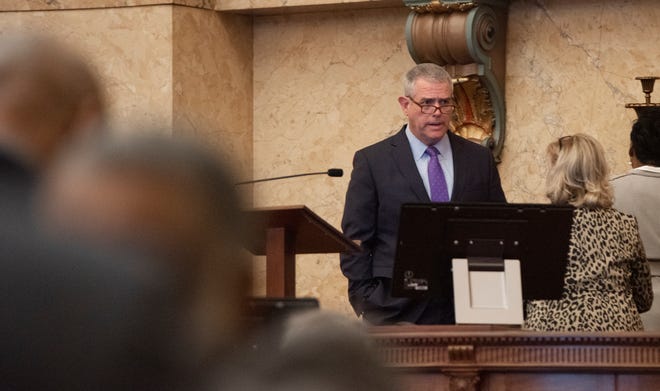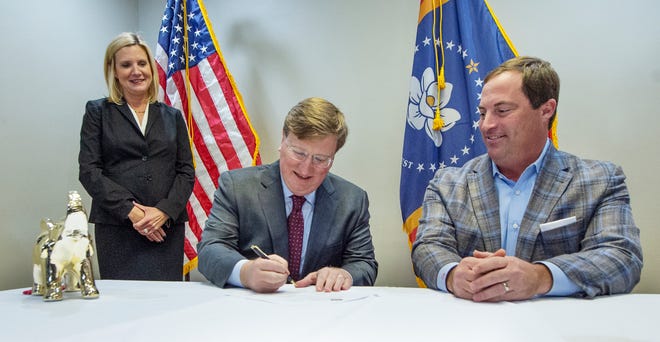
1.4.23 – Clarion Ledger – Wicker Perlis. Mississippi Clarion Ledger
The Mississippi Legislature returned to Jackson Tuesday, two months after it adjourned from a one-day special session and nine months after the end of the 2022 regular session.
As senators, representatives and staff greeted each other in the hallways of the capitol and formally gaveled in inside the chambers, state leaders announced a number of priorities they hope to see passed over the next three months.
Speaker of the House Philip Gunn, who is entering his final term, reiterated a number of agenda-items from past sessions, including income tax elimination. Gunn led a group of representatives last session pushing for Mississippi to do away with its state income tax. Ultimately, a record-setting tax cut passed instead.
“I have been a champion for full elimination for over two years,” Gunn said.
Gunn also reflected on some of the things that have been accomplished by the House during his two decades in the chamber, 12 of which he has spent as speaker.

“I’m very proud of some of the things that we have accomplished over the last 12 years,” Gunn said.
Governor files for re-election:Mississippi Republican Gov. Tate Reeves files for reelection bid
Activist dies:Community leader, activist Ineva May-Pittman dies in house fire, remembered by City Council
Two ways of cementing those accomplishments came to mind.
“The appeal that resulted in the overturning of Roe v. Wade started in the House chamber. We’re very proud of the fact that we led that fight and were able to see that success. I think we want to look at ways moving forward to address any issues that have resulted from that,” Gunn said. “The continuation of the income tax (reduction) is something that we’ve started. I’d like to see that we get that through … get that done as much as we can.”
In a news conference earlier Tuesday, Lt. Gov. Delbert Hosemann, who presides over the Senate, laid out his agenda as well. Top priorities for Hosemann include supporting schools that seek to switch to a modified calendar, allocating remaining infrastructure funds and bringing aid to mothers, children and families following the overturn of Roe v. Wade, which triggered the state’s abortion ban. Hosemann would also like to see the state remain in solid financial footing as the potential of a recession looms.
“We have prepared Mississippi for a recession,” Hosemann said. “If that doesn’t come, that would be wonderful.”
Despite Republicans holding super majorities in both chambers, the priorities laid out by their leaders present potential conflicts which may be repeats of those seen in sessions past.
One of those issues is likely to be whether to extend Medicaid coverage to mothers who are 12-months post-partum. With Hosemann’s support, the Senate has passed such legislation multiple times over the last three sessions, but it has not made its way to the floor of the House.
Hosemann said he expects post-partum Medicaid expansion to pass the Senate again, after it was recommended by multiple witnesses who testified before the Senate Study Committee on Women, Children and Families prior to session. He cited a study from Texas which found a number of positive impacts of such expansion.
“I think post-partum should be in our agenda,” Hosemann said.
Gunn, however, said he is opposed to moving forward with expansion until more data comes in. Since the start of the COVID-19 pandemic, post-partum mothers were covered through federal expansion and Gunn, along with Gov. Tate Reeves, has asked for state agencies to study what impact it has had.
“I am open to being corrected,” Gunn said regarding his current opposition.
Another point of contention comes in what to do about the income tax. Gunn and Reeves have vowed to pursue elimination again, while Hosemann is hesitant to do so.
Meanwhile, in the executive branch, Reeves also had his say on what he’d like to see the legislature send to his desk this year.

Candidates for the 2023 elections began filing with their state parties on Tuesday. After filing for reelection at Mississippi Republican Party headquarters, Reeves addressed some of those priorities, focusing particularly on those included in his budget recommendation.
“We’re still only in the third day of a new year, so have another 12-months left in this term,” Reeves said. “What I’ll tell you is we’re going to continue to fight for our conservative beliefs. We’re going to continue to fight for the conservative values that Mississippians believe in.”
Reeves particularly mentioned limiting the ability of schools and school districts to require students and teachers to refer to transgender students by their preferred pronouns, something he said has not been happening in Mississippi but that he has seen in other states. He also said he hopes to see the state income tax eliminated.
Hosemann said he does not expect problems to arise from clashing personalities or ambitions, with 2023 statewide elections looming in November.
“Everybody’s getting along. It will be fine,” Hosemann said.
Also Tuesday, the first bills to be filed were posted publicly. As of 1:30 p.m. Tuesday, nearly 60 bills had been posted on the Report of All Measures Not Dead. Those include bills that would allow the state to seize gambling winnings from individuals who have failed to pay child support, provide tax credits for certain hospitals, penalize false accusations of hate crimes, classify kratom as a schedule one drug and more.
More bills will be filed in the coming days, with the deadline for general bill filing falling on Jan. 11. All general bills and constitutional amendments must be introduced by Jan. 16.
